
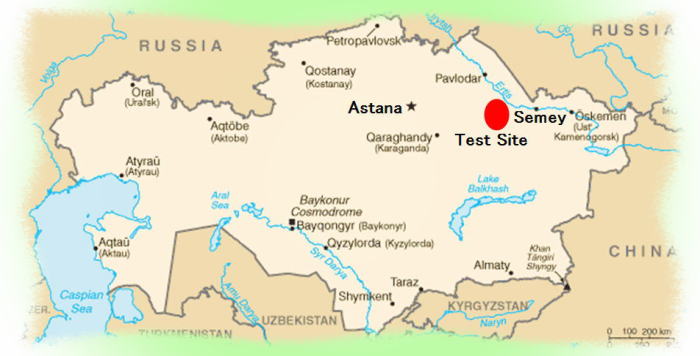
| The Republic of Kazakhstan is a wide country located in the center of Central
Asia. They gained formal independence from the former Soviet Union in 1991. Nuclear tests were repeatedly done by the Soviet Union behind the scenes from August 29, 1949 to October 19, 1989. The number of tests is 456 times: 340 underground tests, 116 atmospheric tests. A lot of people were exposed to radiation without knowing it. The nuclear test site is located in north-eastern Kazakhstan in an area of about 18,400 sq. km. The test site was officially closed on August 29, 1991, on the 42nd anniversary of the first test. It is said that they have found more than 1.5 million victims during those 40 years. Not only do they still have lots of victims in villages around the test site, who were exposed to the radiation, but children continue to be born with deformities or diseases even after 20 years have passed since the closure of the site. |
| Voices of Radiation Victims in Dolon Village on August 31, 2012 | |
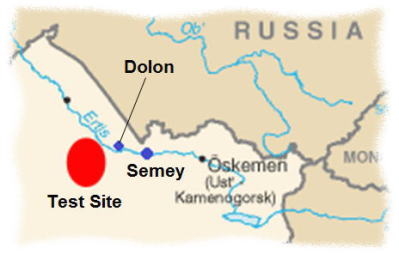 |
In the summer of 2012, we visited Dolon village, which is located near the former nuclear test site (about 45km away). From the center of Semey, Dolon is about 75km, and it takes about an hour forty minutes to get there by car. Many people there make their living by farming, and the population is about 500 people as of the end of August in 2012. We visited the health clinic in Dolon village, and met Dr. Rustemova Gulnara. According to Dr. Rustemova Gulnara, most of residents of Dolon are over 50 years old, and almost everyone has been suffered from radiation exposure. We had an opportunity to interview three of victims thanks to her cooperation. |
| Ms. Shamarbaeva Sholpan | |
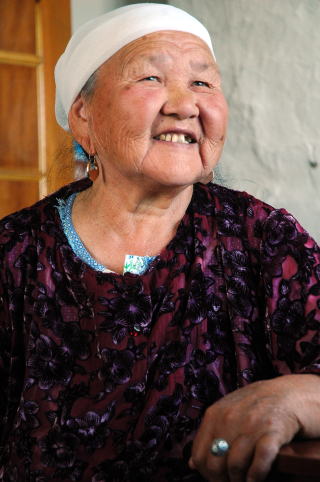 (75 year-old woman) |
(August 31, 2012) Ms. Shamarbaeva was born and raised in Dolon, and saw mushroom-shaped clouds many times. She said that tests were as if an earthquake happened. She was told to leave her house by the army when they had a test. It was to avoid danger of house collapse. However, she didn’t get the information about when they were going to do a test. She suffers from breast cancer, and had surgeries in 1995 and 2000. She was able to take surgeries for free since the government paid for her. Also she receives 10,800 tenge* per month from the government in the compensation for her suffering, but it isn’t enough for her because she has to pay more for medicines. For the cost of living, she relies on her pension, which is 30,000 tenge per month, and support from her family. Her husband died in 2002 because of lung cancer. When we asked what she thinks about a nuclear power plant, she told us that having a nuclear power plant is like sitting on an atomic bomb, and she is absolutely against the use of the nuclear power for future children. She also insisted that nobody should suffer the same disease as she. *tenge is Kazakhstan’s currency 1 tenge = 0.00668 dollar (as of the end of the August, 2012) |
| Ms. Smagulova Magza | |
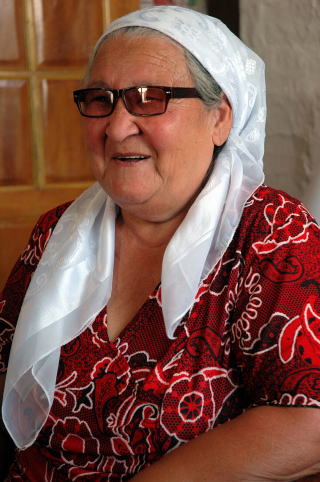 (67 year-old woman) |
(August 31, 2012) Ms. Smagulova was born and grown up in another village. She was 5 years old when she saw the explosion of the nuclear test for the first time. When they had a test, the adalts in village made children stay in one home together. However, because they were very scared of their home shaking from the explosion, they went out of it. Some children stared at the explosion out of curiosity. She moved to Dolon village 51 years ago. She was diagnosed with hypertension when she was 46 years old, and had a surgery for her eyes in 2011. Her husband died of lung cancer in 2004. She receives 15,000 tenge* per month from the government as compensation, and 30,000 tenge per month for her pension. When we asked her whether the compensation fee is enough, she told us that thanks to her family support she isn’t really conscious of it. Also when she was asked what she thinks about a nuclear power plant, she insisted that we don’t need it at all, and also said that she worries that nuclear power will affect children’s future. Finally, when we asked what she thinks about the nuclear tests conducted by the former Soviet Union, she emphasized that she would never be able to forgive them. *tenge is Kazakhstan’s currency 1 tenge = 0.00668 dollar (as of the end of the August, 2012) |
| Ms. Prjelskaya Nadezhda | |
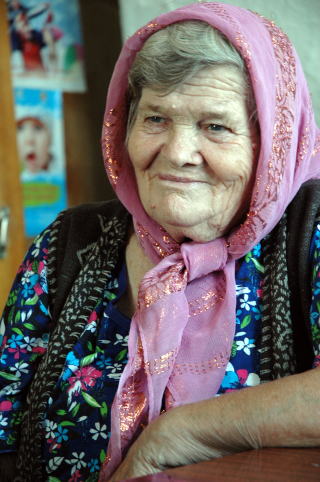 (77 year-old woman) |
(August 31, 2012) Ms. Prjelskaya moved to Dolon for her work as an architect when she was 30 years old. Since then she had seen mushroom-shaped clouds many times. She was told to stay out of her house during a test by the army, because the house shook and it was very dangerous inside. She was also asked not to view the explosion but she stared at it out of curiosity. Furthermore, she saw the fur of sheeps and horses fall off. Then they died soon. She gradually began to lose her teeth at the age of 36, and only two teeth remain. There are lots of old people in the village who are losing their teeth like her. Her husband suddenly died in 1999. She even told us that she was very scared because many people around her died of cancer. She also receives government compensation, but the amount depends on where a person came from and how long the person stayed in an affected area. For her, she receives 30,000 tenge* as the compensation and pension per month. However, because she easily gets sick, the money isn’t enough to cover her living expense. Her two daughters are supporting her now. It was the first time for her to talk about her experiences with the nuclear test. She said that she was very impressed because young people like us want to hear the victims’ voices and disseminate them. *tenge is Kazakhstan’s currency 1 tenge = 0.00668 dollar (as of the end of the August, 2012) |
| The response from Dr. Rustemova Gulnara (in Dolon, on August 31, 2012) | |
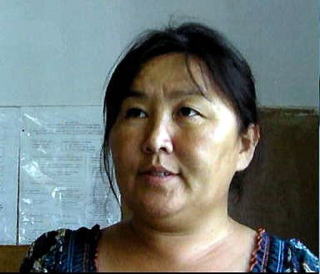 Dr. Rustemova Gulnara 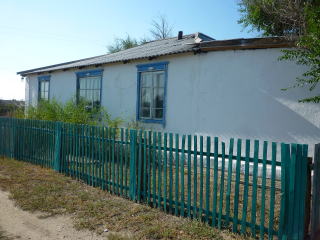 the health clinic in Dolon village |
According to Dr. Rustemova, many people in the village suffer from cardiac
disease, blood pressure related diseases, or cancer. Among cancer patients,
lung cancer is most common. Also there are a lot of patients who have dental
abnormalities and mental troubles. Some people kill themselves for unknown
reasons abruptly. Such suicides spread not only among victims but also
next two generations. It is pointed out that radiation exposure might cause
people to commit suicide. There are two nurses in her clinic, and she also sees patients in 3 other villages (Mostic, Cheremushka, Budene) besides Dolon. Because the medical facilities in Dolon are insufficient, patients, who need medical treatments, must go to a bigger hospital in Beskaragai village. However, transportation isn’t provided, so patients need to pay themselves for a taxi to go there. Victims have just started to receive medicine for cardiac disease from the government since 2012, but they don’t provide them with expensive medicines. (In the hospital of Beskaragai village, hospital admissions for up to 10 days are free. If you have a car, you get gas for free from the hospital.) Dr. Rustemova told us that we should keep doing cultural exchanges around the world, and continue peace activities. |